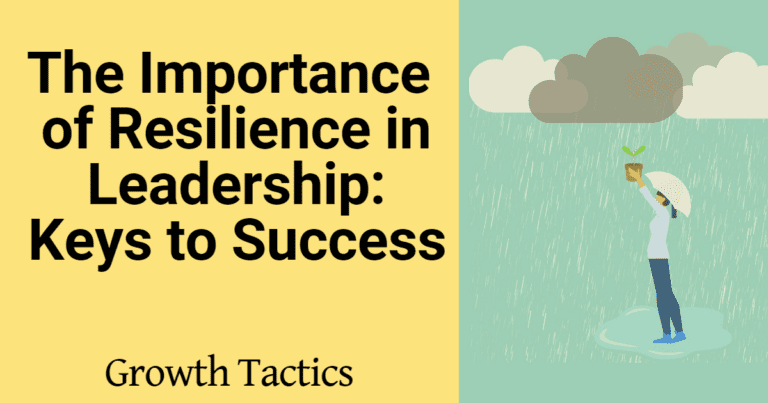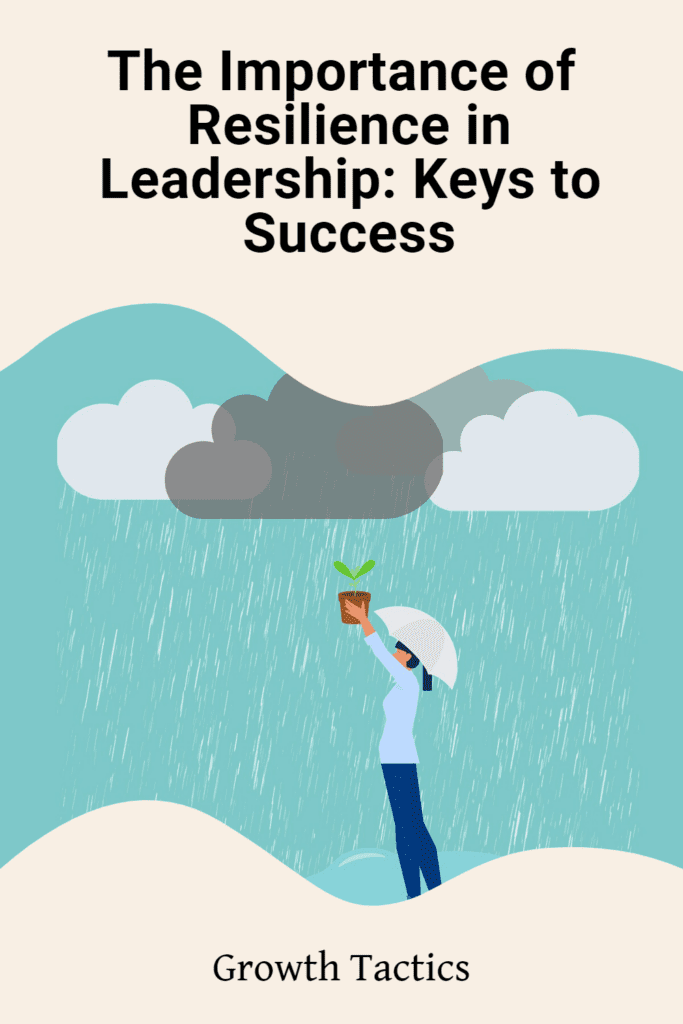Are you ready to dive into the world of resilient leadership? Well, you’re in luck because today we’re going to explore the importance of resilience in leadership. So, buckle up and get ready to learn how resilience can transform you into a better leader!
Jump To Section
What Is Resilience and Why Does It Matter in Leadership?
Let’s start by understanding what resilience truly means and why it’s crucial for effective leadership. Resilience refers to the ability to bounce back from adversity, navigate challenges, and adapt to change. It’s not a one-time quality but a lifelong journey of growth and development.
In leadership, resilience is like a superpower. It empowers leaders to face difficult situations with confidence and overcome setbacks. By demonstrating resilience, leaders inspire their teams and create a culture of resilience within their organizations. It’s through the development of resilience that leaders can bring out the best in themselves and their teams.
Developing Resilience Within
Ready to dive deeper into the world of developing resilience from within? Great! Let’s unpack this important aspect of resilient leadership and discover how you can cultivate your inner strength.
Cultivate Self-Awareness and Emotional Intelligence
First and foremost, developing resilience starts with self-awareness. Understanding your own strengths and weaknesses allows you to navigate the ups and downs of leadership with more grace and confidence. Take time to reflect on your experiences, identify patterns, and acknowledge areas that need improvement.
Emotional intelligence is another key component of resilience. By honing your emotional intelligence skills, you’ll be better equipped to handle challenging situations and interact effectively with others. Pay attention to your own emotions and those of your team members, and practice empathy and active listening to build stronger relationships.
Thrive in the Face of Adversity and Bounce Back from Setbacks
Resilient leaders thrive in the face of adversity. Instead of being overwhelmed by challenges, they see them as opportunities for growth. When confronted with setbacks, take a step back, assess the situation, and find ways to learn from it. Embrace a growth mindset and view failures as valuable lessons that can propel you forward.
To bounce back from setbacks, cultivate a positive mindset and surround yourself with supportive people. Seek out mentors or coaches who can provide guidance and perspective. Create a personal mantra or affirmations that remind you of your resilience and keep you focused on your goals.
Resilient Leadership: The Key to Success
Resilient leaders are the beating heart of successful organizations. They create an environment where resilience is valued and modeled by others. By demonstrating resilience, leaders inspire their teams to overcome obstacles and take risks. They adapt their leadership style to the needs of their team and the face of adversity.
The importance of resilience in leadership cannot be overstated. It enhances leadership effectiveness, drives innovation, and fosters a culture of growth and continuous improvement. Resilient leaders are better equipped to make difficult decisions and navigate their organizations through times of crisis.
Strategies to Become a More Resilient Leader
So, you’re ready to supercharge your resilience and become an even more remarkable leader? Fantastic! In this section, we’ll dive into some practical strategies to help you unlock your inner superpowers and become a more resilient leader. Get ready to level up!
Building Emotional Strength and Managing Stress
Building emotional strength is like doing push-ups for the mind. It’s all about developing mental muscles that can withstand the challenges and pressures of leadership. So, how can you do that? Well, start by practicing self-care. Get enough sleep, eat well, and make time for activities that recharge your batteries. And don’t forget to exercise regularly – it’s not only great for your physical health but also a powerful stress-buster.
Another important strategy is learning to manage stress effectively. Stress is an inevitable part of leadership, but resilient leaders know how to keep it in check. Take breaks throughout the day to relax and recharge. Practice mindfulness or deep breathing exercises to bring yourself into the present moment. And, hey, don’t be afraid to delegate tasks or ask for support when needed. It’s all about lightening the load and maintaining your resilience.
Turning Challenges into Opportunities for Growth
Resilient leaders have a special talent for turning challenges into stepping stones towards growth. When faced with a difficult situation, rather than succumbing to negativity, they harness the power of positivity. How can you do this? Start by reframing challenges as opportunities. Look for the lessons hidden within the obstacles you face. Embrace a growth mindset – believe you can learn and improve from any experience.
Take a moment to reflect and ask yourself: “What can I learn from this situation? How can I grow from it?” By focusing on the opportunities for growth, you’ll transform challenges into valuable stepping-stones toward personal and professional development.
Fostering a Cohesive Team and Supporting Others in Times of Crisis
Resilient leaders understand the power of teamwork and the importance of supporting others in times of crisis. Creating a cohesive team is like building an invincible fortress – together, you can weather any storm. So, how can you foster a strong team dynamic?
Start by practicing open and honest communication. Encourage your team members to share their thoughts, concerns, and ideas. Foster a culture of psychological safety where everyone feels comfortable speaking up. Creating an environment of trust will empower your team to collaborate, innovate, and overcome challenges together.
And remember, supporting others in times of crisis is a superhero move. Be there for your team members – listen to their concerns, provide guidance, and offer a helping hand. Show empathy and compassion. Check in regularly to see how they’re doing. By demonstrating genuine care and support, you’ll build a resilient team that stands strong in the face of adversity.
The Road Ahead: Future Challenges and Opportunities
As we look towards the future, we must recognize that challenges and opportunities will continue to arise. Resilient leaders are adaptable and embrace change, even in the face of uncertainty. They have the ability to make difficult decisions and navigate their organizations toward long-term success.
To thrive in a rapidly changing world, leaders must cultivate resilience within themselves and within their organizations. By developing a strong support network and prioritizing their own well-being, leaders can navigate the challenges that lie ahead with grace and confidence.
Mastering Self-Care: Fueling Your Resilience Tank
As a resilient leader, you know that taking care of yourself is just as important as taking care of your team. Self-care is like filling up your resilience tank, providing you with the energy and strength to face whatever challenges come your way. So, let’s dive into the world of self-care and uncover some strategies to fuel your resilience!
Prioritize Your Well-being
You are the heart and soul of your team, so it’s crucial to prioritize your own well-being. Start by carving out time for yourself each day. Whether it’s a few minutes of meditation, a walk in nature, or indulging in a hobby you love, make self-care a non-negotiable part of your routine.
Remember, self-care isn’t selfish, it’s necessary. Your well-being directly impacts your ability to lead effectively. By taking care of yourself, you’ll recharge your resilience tank and show up as the best version of yourself for your team.
Establish Boundaries
Resilient leaders understand the importance of setting boundaries. Constantly saying yes to every request or working around the clock is a recipe for burnout. Instead, learn to say no when necessary and establish healthy boundaries.
Identify your priorities and make sure you allocate time and energy to them. Delegate tasks when possible and don’t be afraid to ask for help. Remember, you can’t pour from an empty cup. By setting boundaries, you’ll protect your energy and be better equipped to handle the challenges that come your way.
Embrace Mindfulness and Relaxation
In today’s fast-paced world, finding moments of tranquility can feel like a luxury. However, incorporating mindfulness and relaxation techniques into your routine is crucial for developing resilience.
Practice mindfulness by bringing your full attention to the present moment. Engage in activities that help you disconnect from work and recharge your mind and body. Whether it’s practicing yoga, listening to soothing music, or indulging in a good book, find what works for you and make it a priority.
Remember, relaxation is not just a one-time event but an ongoing practice. By incorporating mindfulness and relaxation into your daily life, you’ll cultivate a sense of calm and clarity that fuels your resilience.
Seek Support and Celebrate Wins
Resilience doesn’t mean facing challenges alone. It’s important to lean on your support network and celebrate wins along the way. Surround yourself with positive, uplifting people who believe in you and your vision.
Seek out mentors or peers who can provide guidance and support. Share your victories with your team and take time to recognize and celebrate their achievements as well. By fostering a culture of support and celebration, you’ll create an environment that fuels collective resilience.
Wrapping It Up
So there you have it – the importance of resilience in leadership. By embracing resilience, you can become a better leader equipped with the skills to navigate any challenge that comes your way. Remember, resilience is a lifelong journey, and by continually developing and strengthening this quality, you’ll create a more successful and resilient organization.


